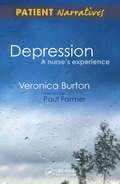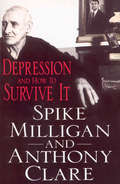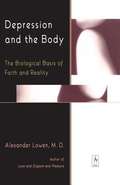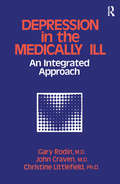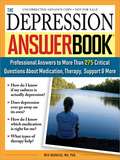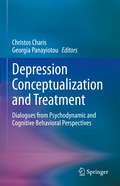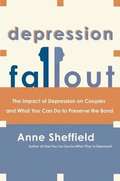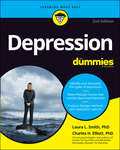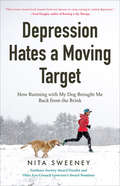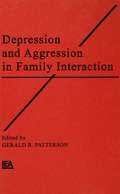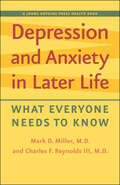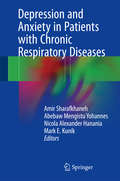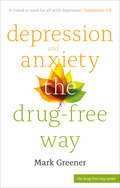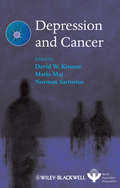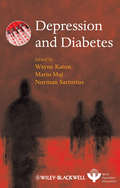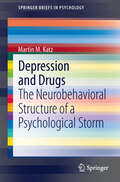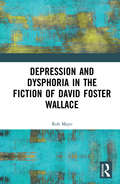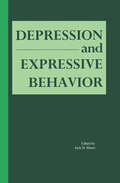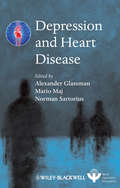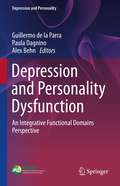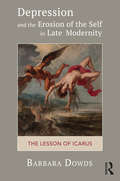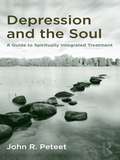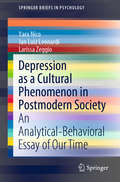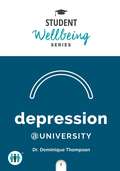- Table View
- List View
Depression - A Nurse's Experience: Shadows of Life (Radcliffe Ser.)
by Moira Stewart Veronica BurtonVeronica Burton's first experience of depression came as a teenager. Following a ten year remission, during which she gained her general nursing qualification and completed her Special and Intensive Nursing of the Newborn course, work-related events precipitated a depressive relapse that has lasted to the present day. Since her retirement on medical grounds, she has campaigned against prejudice by nurses toward other nurses - including mental health nurses - who need psychological support of any kind. This book recounts the author's experiences of major depression, hospital admissions and treatments including medication, ECT and 'talking treatments'. It discusses the care given by medical and nursing staff and social and medical prejudices against those with psychiatric illnesses from a medical practitioner's perspective. Like stumbling on a secret room in a familiar building. In illuminating these previously inaccessible corners of her illness experience, she forces me to challenge my own taken-for-granted version of her history. Familiar territory seen from another perspective suddenly seems perturbing. As psychiatrists, too often we are drawn into seeing people through a lens of illness, as if this was their only identity.A" Veronica Burton's Psychiatrist Nick Rose in his Postscript
Depression And How To Survive It
by Spike Milligan Professor Anthony Clare'Anyone worried about a depressed friend or relative should read this book'DAILY TELEGRAPH_________________________________________________ In 1982, leading psychiatrist and TV presenter Anthony Clare interviewed Spike Milligan for the radio series In The Psychiatrist's Chair. He was so overwhelmed by Milligan's account of his forty years of depressive experiences that he knew he had found the right person to help him illuminate and explore the mysterious and sometimes terrifying condition that is clinical depression. Depression and How to Survive It charts the development of world-famous comedian Spike Milligan's clinical depression and the strategies he used in dealing with the often-misunderstood disorder.Drawing inspiration and advice from Spike's experience, this unique book from one of Britain's most successful psychiatrists, will take you to the depths of human unhappiness and show you the way towards leading a happy life.
Depression And The Body: The Biological Basis Of Faith And Reality (Compass)
by Alexander LowenThe depressed person, says Dr. Alexander Lowen, is out of touch with reality - and especially with the reality of his or her own body. This inspiring, pioneering book explores the cultural and psychological forces that contribute to this condition and shows how we can overcome depression, first by reestablishing the connection to our physical selves and learning to recognize the physical manifestations of our emotions. Drawing on his vast experience with depressed patients, Dr. Lowen outlines a series of simple but remarkably effective exercises that help us reawaken to our own inherent energies, enable us to express our love and uniqueness, and recover our spirituality and faith in living. "[Dr. Lowen's] book is both important and, for the serious lay reader, engrossing. He is an unusually lucid writer, unburdened by jargon, candidly personal." - Publishers Weekly
Depression And The Medically Ill: An Integrated Approach
by Gary Gary RodinDiscusses the relationship between depression and medical illness and the diagnosis and management of depression in the medically ill. Covers methodological issues related to assessment and diagnosis of depression and analyzes psychological, social and biological factors associated with depression.
Depression Answer Book
by Wes BurgessDepression affects 14.8 million American adults every year. How do I know if my sadness is actually depression? What conditions often coexist with depression? How can I help a family member or friend who is depressed? Depression is not merely a bad day or a blue mood—it's a serious disorder that affects people both mentally and physically, and can become debilitating and even fatal if not recognized and properly treated. If you suspect that you or a loved one might be suffering from depression, or if you've recently been diagnosed, The Depression Answer Book can answer all the questions you have about how to get back to yourself. Written by an experienced psychiatrist, The Depression Answer Book covers such pressing topics as: * How many types of depression are there? * Couldn't everyone be diagnosed with depression at one time or another? * What should I do in a crisis? * What can I do on my own to help my depression? * Do I really need therapy and medication? * How do I know a medication is working? At a time when individuals are overwhelmed with confusing and often conflicting information and emotions, The Depression Answer Book explains confusing medical lingo and provides straightforward answers to pressing questions.
Depression Conceptualization and Treatment: Dialogues from Psychodynamic and Cognitive Behavioral Perspectives
by Christos Charis Georgia PanayiotouDepression, a highly common clinical disorder, is an important and clinically relevant topic for both clinical researchers and practitioners to address, because of its prevalence, impact on the individual and society, association with other mental and physical health problems and the social contexts in which it develops. Depression ranks in Germany and central Europe as the third among the leading mental disorders and world-wide is a leading cause of disability. It is estimated that 8.3 % of the German population is depressed within a year (11.2 % women, 5.5 % men). These statistics mean that 4 million people per year are depressed in Germany alone (one year prevalence). According to the WHO, over 300 million people world-wide experience depression and in the USA the financial burden of this disorder, due to disability and work absenteeism, reaches Depression is also becoming more frequent over time and has a high risk of recidivism –particularly since its most common form, Major Depressive Disorder (DSM-5; ICD10) tends to occur in episodes. For example, 20% to 40% of people become depressed again within two years after their first depressive episode, meaning that a major aim of any therapeutic intervention should be to prevent future relapses. Depression also shows very high comorbidities with other mental and physical health conditions. Its overlap with anxiety pathology is so high that clinicians are concerned with whether the two disorder categories are indeed distinct or if they show substantial etiological overlap. Depression is also associated with heart disease and even cancer, making it a risk factor for mortality and morbidity that needs to be identified early and addressed effectively. In addition to Major Depressive Disorder, the often severe Bipolar Disorder, and the chronic form of Depression referred to as dysthymia are additional mood disorders that among them require careful differential diagnosis. They also lead to questions regarding their common or distinct etiological mechanisms. In order to gain a better understanding of Depression as a clinical disorder, one needs to look at it as a multifaceted phenomenon. Depression is a neurobehavioral condition, and one has to be up to date and have solid understanding of its biological substrate, at a genetic, neuronal, hormonal and pharmacological level. Depression is also a socio-demographic phenomenon, and one needs to examine its epidemiology, that might contain significant cues towards its clearer understanding. It is more prevalent, for example, in certain regions, climates, age groups and genders (much more prevalent in women, with age of appearance in young adulthood but also presents as a significant problem for youth and the elderly), is associated with stereotypes and stigma and can be the aftermath of crises, trauma and loss. The etiology of Depression remains under scrutiny, though recently much more knowledge is emerging from contemporary neuroimaging, genotyping and data science methods. Different neural and behavioral systems may be involved contributing to the significant heterogeneity within the disorder. Social roles, stressors, attachment patterns, family support and social networks, and individual (e.g. gender linked) vulnerabilities may contribute significantly towards increasing risk for developing depression. Different therapeutic approaches, like those stemming from the psychoanalytic/psychodynamic perspectives and those stemming from the cognitive/behavioral (2nd and 3rd wave) tradition focus on the components of etiology considered most dominant. As science progresses with clearer evidence regarding the important etiological factors and their interactions, these different perspectives, each with its own contribution, may need to take new developments into consideration, adapt and even begin to converge. These different aspects of the topic of Depression, which are central to the scientific aims of clinical scientists, but also permeate the way cl
Depression Fallout
by Anne SheffieldUsing the vivid, poignant and personal stories of the members of a website support group she founded (www.depressionfallout.com), Anne Sheffield, the author of two highly acclaimed books on depression, provides an honest record of what happens to a love relationship once depression enters the picture, and offers solid advice on what the non-depressed partner can do to improve his or her own life and the relationship. Of the millions of people who suffer from a depressive illness, few suffer in solitude. They draw the people they love - spouses, parents, children, lovers, friends - into their illness. In her first book, How You Can Survive When They're Depressed, Anne Sheffield coined the phrase 'depression fallout' to describe the emotional toll on the depressive's family and close friends who are unaware of their own stressful reactions and needs. She outlined the five stages of depression fallout (confusion, self-doubt, demoralisation, anger, and the need to escape) and explained that these reactions are a natural result of living with a depressed person.
Depression For Dummies (For Dummies Ser.)
by Laura L. Smith Charles H. ElliottThe good news on beating the blues Do you want the good, the bad, or the best news first? OK, the bad news is that an estimated 264+ million people worldwide suffer from a depressive illness. The good news is that we know how to defeat these illnesses better than ever before using a growing range of highly effective psychotherapies, medications, and other therapeutic methods that are improving all the time. And the best news: because of these advances, the majority of people no longer need to suffer the debilitating—and sometimes dangerous—effects of long-term depressive illness. The new edition of Depression For Dummies shows how you can make this happen for you by providing the latest and best information on how to banish the noonday demon and bring the sunshine back into your world. In this friendly, cheerful, no-nonsense guide, leading clinical psychologists Laura L. Smith and Charles H. Elliot give you the straight talk on what you face and proven, practical advice on how to punch back and win. Showing you how to know your enemy, they demystify common types of depression, explain its physical effects, and help identify the kind you have. Armed in this way, you can take firmer steps toward the lifestyle changes—as well as therapy or medication—that will put you back in control. Learn about different forms of depression Build simple, daily habits into your life that help banish the blues Understand conventional, alternative, and experimental therapies Move on: avoid relapses and stay happy! Whatever your level of depression—occasional bouts or long-term—this book gives you the insight, the tools, and the inner strength and persistence to put enjoyment back in your life.
Depression Hates a Moving Target: How Running with My Dog Brought Me Back from the Brink
by Nita Sweeney&“Sweeney&’s courage and grit shine through her candid memoir . . . This book has the power to inspire countless others as they pace themselves to mental health.&” ―Aimee Liu, author of Gaining: The Truth About Life After Eating Disorders Before she discovered running, Nita Sweeney was forty-nine years old, chronically depressed, occasionally manic, and unable to jog for more than sixty seconds at a time. Using exercise, Nita discovered an inner strength she didn&’t know she possessed, and with the help of her canine companion, she found herself on the way to completing her first marathon. In her memoir, Sweeney shares how she overcame emotional and physical challenges to finish the race and come back from the brink. Anyone who has struggled with depression knows the ways the mind can defeat you. However, it is possible to transform yourself with the power of running. You may learn that you can endure more than you think, and that there&’s no other therapy quite like pavement beneath your feet.Depression Hates a Moving Target is a witty and poignant story of rediscovery. Whether you&’re born to run or just looking for rebirth, you will: · Be inspired by the powerful story of one woman—and her dog · Cheer on Nita as she endures the challenges of a marathon and a mind in turmoil · Discover the power of running to overcome obstacles Winner of the Maxwell Award from the Dog Writers Association of America
Depression and Aggression in Family interaction (Advances in Family Research Series)
by Gerald R. PattersonThis collection updates research on family processes relating to aggression and depression. It contains state-of-the-art information and such recent methodological innovations as time series, sequential analysis, and method problems in the application of a structural equation modeling. An ideal supplementary text and reference for graduate students and professionals in clinical, social, environmental, and health psychology, family counseling, psychotherapy, and behavioral medicine.
Depression and Anxiety in Later Life: What Everyone Needs to Know (A Johns Hopkins Press Health Book)
by Mark D. Miller Charles F. Reynolds IIIDepression and anxiety can be avoided or minimized through medication and therapy and by adapting to changing circumstances as we age.Physical problems and emotional stresses, such as bereavement, health conditions, pain, concerns about the future, side effects of medications, and the accumulated effects of lifestyle choices, may lead to depression or anxiety in older people. However, as Drs. Mark D. Miller and Charles F. Reynolds III know, these mental disorders are not a natural or an inevitable part of aging. In Depression and Anxiety in Later Life, these psychiatrists show how depression and anxiety can be avoided or minimized by adapting to changing circumstances while controlling risk factors and getting help when it's needed.This reassuring book balances discussions of the causes, symptoms, and treatments of mental illness with descriptions of successful adaptive aging. Case studies illustrate the less obvious depression symptoms of irritability, disorganization, and social withdrawal. Readers will find information about memory loss, pain, sleep, nutrition, and end-of-life issues particularly helpful.Aging can be challenging, but it doesn’t always lead to depression or anxiety. Depression and Anxiety in Later Life will help older people, their family members, and caregivers make positive changes to take control of their own individual situations.
Depression and Anxiety in Patients with Chronic Respiratory Diseases
by Amir Sharafkhaneh Abebaw Mengistu Yohannes Nicola Alexander Hanania Mark E. KunikIn this unique title, the full range of chronic respiratory conditions and their association with psychiatric comorbidities are explored and targeted management options are outlined. Indeed recent studies indicate a far higher prevalence of depression and anxiety in patients afflicted with chronic respiratory conditions than in patients with other chronic disorders. Unlike other publications in the field of pulmonary disease, Depression and Anxiety in Patients with Chronic Respiratory Diseases details this significant correlation. The book is comprehensive in scope, covering such topics as depression and anxiety across the age spectrum, diagnostic tools for anxiety and depression, anxiety and depression in COPD patients, depression and anxiety in adult patients with asthma, and end-stage lung disease and lung transplantation, among others. In this novel work, the volume Editors enlist a team of renowned experts in the fields of respiratory and psychiatric disorders to combine a thorough synthesis of the literature with targeted, practical strategies for management. Depression and Anxiety in Patients with Chronic Respiratory Diseases is an invaluable resource for all clinicians who care for patients with chronic and advanced lung diseases.
Depression and Anxiety the Drug-Free Way
by Mark GreenerDepression and anxiety aren’t single diseases – they are as personal as your fingerprints, and can arise from many different causes. Hence, the one-drug-fits-all approach may not work for you. Sometimes too drugs can give people a ‘breathing space’ but don’t cure depression and anxiety, or address any underlying issues. This book explores why drugs are only part of the answer and suggests other solutions including lifestyle changes and psychotherapy. This new edition updates the information about depression and anxiety and their treatment. The update focuses on epidemiology, outcomes, and non-pharmacology treatments. New topics include research on sleep management and depression, particularly in young people; longterm health risks including earlier death; social media and depression; alcohol and depression.
Depression and Anxiety the Drug-free Way
by Mark GreenerDepression and anxiety aren't single diseases ? they are as personal as your fingerprints, and can arise from many different causes. Hence, the one-drug-fits-all approach may not work for you. Sometimes too drugs can give people a `breathing space? but don?t cure depression and anxiety, or address any underlying issues. This book explores why drugs are only part of the answer and suggests other solutions including lifestyle changes and psychotherapy. This new edition updates the information about depression and anxiety and their treatment. The update focuses on epidemiology, outcomes, and non-pharmacology treatments. New topics include research on sleep management and depression, particularly in young people; long term health risks including earlier death; social media and depression; alcohol and depression.
Depression and Cancer
by Mario Maj Norman Sartorius David W. KissaneRecently, there has been a growing awareness of the multiple interrelationships between depression and cancer. Depression and Cancer is devoted to the interaction between these disorders. The book examines various aspects of this comorbidity and describes how the negative consequences of depression in cancer could be avoided or ameliorated, given that effective depression treatments for cancer patients are available. Renowned psychiatrists and oncologists summarize the latest evidence on the epidemiology, pathogenesis, screening and recognition, and cultural and public health implications of depression in persons with cancer, among other topics.
Depression and Diabetes
by Mario Maj Norman Sartorius Wayne KatonIn recent years, there has been a growing awareness of the multiple interrelationships between depression and various physical diseases. The WPA is providing an update of currently available evidence on these interrelationships by the publication of three books, dealing with the comorbidity of depression with diabetes, heart disease and cancer.Depression is a frequent and serious comorbid condition in diabetes, which adversely affects quality of life and the long-term prognosis. Co-occurrent depression presents peculiar clinical challenges, making both conditions harder to manage.Depression and Diabetes is the first book devoted to the interaction between these common disorders. World leaders in diabetes, depression and public health synthesize current evidence, including some previously unpublished data, in a concise, easy-to-read format. They provide an overview of the epidemiology, pathogenesis, medical costs, management, and public health and cultural implications of the comorbidity between depression and diabetes. The book describes how the negative consequences of depression in diabetes could be avoided, given that effective depression treatments for diabetic patients are available.Its practical approach makes the book ideal for all those involved in the management of these patients: psychiatrists, psychologists, diabetologists, general practitioners, diabetes specialist nurses and mental health nurses.
Depression and Drugs: The Neurobehavioral Structure of a Psychological Storm
by Martin M. KatzThis book integrates the current state of knowledge on the association of neurochemical and psychological factors underlying the concept of depression or on the process and nature of the drug-induced changes that lead to recovery. Highlighting the results of two major multisite collaborative studies of the psychobiology of depression, the author demonstrates how more refined clinical methods uncover the initial behavioral actions of the drugs and chart the time course of their actions. The results disconfirm earlier textbook reported findings that these actions are delayed for several weeks beyond the almost immediate neurochemical effects. The "multivantaged" method makes possible distinguishing the clinical actions of different classes of antidepressant drugs.
Depression and Dysphoria in the Fiction of David Foster Wallace
by Rob MayoDepression and Dysphoria in the Fiction of David Foster Wallace is the first full-length study of this critically overlooked theme, addressing a major gap in Wallace studies. Wallace has long been recognised as a ‘depression laureate’ inheriting a mantle previously held by Sylvia Plath due to the frequent and remarkable depictions of depressed characters in his fiction. However, this book resists taking Wallace’s fiction at face value and instead situates close reading of his complex fictions in theoretical dialogue both with philosophical and theoretical texts and with contemporary authors and infl uences. This book explores Wallace’s complex engagement with philosophical and medical ideas of emotional suffering and demonstrates how this evolves over his career. The shifts in Wallace’s thematic focus on various forms of dysphoria, including heartache, loneliness, boredom, and anxiety, as well as depression, correspond to an increasingly pessimistic philosophy underlying his fiction.
Depression and Expressive Behavior
by Jack D. MaserThe clinical interview is an indispensable first step in a comprehensive general medical evaluation. In psychiatry and clinical psychology, it is too frequently the only step in the evaluation. Based on papers presented at an National Institute of Mental Health sponsored workshop, this volume specifically addresses the question of whether the clinical phenomenology necessary for diagnosis of mental disorders can be assessed in ways more objective and accurate than routine clinical observation.
Depression and Heart Disease
by Norman Sartorius Mario M. Maj Alexander GlassmanRecently, there has been a growing awareness of the multiple interrelationships between depression and various physical diseases. Patients with psychiatric problems, particularly depression, may be more susceptible to cardiovascular disorders. Depression and Heart Disease synthesizes current evidence, including some previously unpublished data, in a concise, easy-to-read format. The authors succinctly describe the epidemiology, pathogenesis (including cytokines and genetics), and risk factors of the comorbidity between depression and heart disease. The book also reviews the best pharmacological and psychotherapeutic approaches for people with this comorbidity.
Depression and Personality Dysfunction: An Integrative Functional Domains Perspective (Depression and Personality)
by Guillermo de la Parra Paula Dagnino Alex BehnThis book analyses the clinical interaction between depression and personality dysfunction to help clinicians better understand and treat patients with complex depression. It proposes an innovative perspective to clinical work that moves away from a disorder-centered approach to a person-centered approach by analysing complex depression through the lens of functional domains related to personality functioning and applying Research Domain Criteria to diagnosis and treatment planning. By doing so, it aims to contribute to the development of precision psychotherapy by applying the principles of precision medicine to mental health care.The book is divided in two parts. Chapters in the first part review problems in five domains of personality dysfunction that drive complex depressive presentations – identity, affect regulation, self-other regulation, social dysfunction and self-criticism – and the neurobiological findings underlying them. In the second part, authors present integrative models of depression and personality dysfunction and their implications for diagnosis and treatment. Depression and Personality Dysfunction: An Integrative Functional Domains Perspective is a scientific and clinical guide for the understanding and treatment of patients with depression complicated by personality dysfunction. It will be a useful tool for clinicians looking for resources to develop a more person-centered and evidence-based approach to mental health care.
Depression and the Erosion of the Self in Late Modernity: The Lesson of Icarus
by Barbara DowdsDepression is not a disease of the brain, a genetic disability or even a mood disorder. Rather, shutdown, numbness or sadness are non-pathological adaptations to adverse childhood and adult environments. This challenging book thus understands depression as a wise response to an unliveable situation. It can teach us what is wrong with our lives and what we must learn in order to go beyond symptom relief and reconnect to our most fundamental needs, relational, existential and spiritual. Because moods shape how we engage with our outer and inner worlds, they underlie all human behaviour. If the sociocultural world is toxic or frustrates our core needs, we will withdraw to protect ourselves. Those who have encountered a non-facilitating environment in childhood will be even more sensitive to adult stresses, since their self-organisation is fragile and non-resilient. As depression is so complex, understanding it demands an integrative approach.
Depression and the Soul: A Guide to Spiritually Integrated Treatment
by John R. PeteetIn Depression and the Soul, John Peteet proves the old adage that the best physician is also a philosopher. He considers how to approach the problem of depression within a larger context, and reviews current concepts of successful living relative to the heart (emotion and volition), the mind (cognition and coping), and the soul (the self in relation to transcendent reality). Each chapter goes on to further explore the relationship between depression and the context of a patient’s entire life. This is done through consideration of how the existential struggles of depressed individuals engage their spiritual lives, by reviewing current empirical literature on depression and spirituality, comparing the perspectives of various spiritual traditions or world views, and summarizing ways that spirituality and depression interact.
Depression as a Cultural Phenomenon in Postmodern Society: An Analytical-Behavioral Essay of Our Time (SpringerBriefs in Psychology)
by Yara Nico Jan Luiz Leonardi Larissa ZeggioThis book presents an analysis of contemporary society based on the experimental and interpretative models produced by the experimental analysis of behavior, in order to think about the ways in which current social contingencies can affect the life of individuals making them more depressive. It addresses the phenomenon of depression in a broad way. From its conception as a scientific concept to sociological explanations to explain its emergence, the book presents in a very well founded way the necessary knowledge to clarify, understand, and seek treatment and prevention for this major social evil.The authors begin with a description of the current diagnostic parameters of major depressive disorder followed by alarming global epidemiological data showing that depression has affected all races, social classes, genders and creeds. They then address the topic departing from an approach based on the experimental analysis of behavior, but also in dialogue with other philosophical and conceptual traditions, to show how current social relationships contribute to the development of major depressive disorder. Depression as a Cultural Phenomenon in Postmodern Society will be a valuable tool for health professionals looking for a wider approach to depression prevention and treatment. An approach that looks not only to the isolated individual, but takes into account the whole social context that contributes to cause or to prevent major depressive disorder.
Depression at University (Student Wellbeing Series)
by Dominique ThompsonThis illustrated pocket book offers advice, practical tips, and useful exercises for students to combat low moods and depression at university. Written by the award-winning student mental health specialist, Dr Dominique Thompson, this easy-to-read guide will ensure that students have all the tools they need to understand the sources of their depression and take steps to reclaim their life from its debilitating effects.Although plenty of people talk about depression, there are still a lot of misconceptions about it. This book will clearly explore what depression is, and investigate the ways in which it can affect anyone. With extracts from students’ own accounts about their depression, and how they learned to manage it, and lots of practical, easy-to-follow examples and exercises, the book will help readers understand their depression, so they can deal with it in the right way for them.Above all, this book will help readers gain real power over their depression so that they can enjoy the full university experience on their terms.
